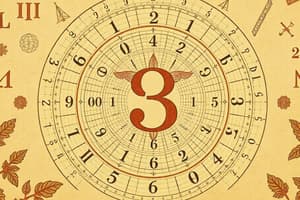Podcast
Questions and Answers
Which of the following is a crucial step in effective mathematical problem-solving?
Which of the following is a crucial step in effective mathematical problem-solving?
- Relying solely on intuition without performing checks.
- Memorizing formulas without understanding their derivation.
- Identifying the problem, understanding givens, and selecting appropriate methods. (correct)
- Ignoring possible biases to speed up the solving process.
Why is probability considered a core element in statistical analysis?
Why is probability considered a core element in statistical analysis?
- It enables quantification of uncertainties and models randomness. (correct)
- It simplifies data to eliminate the need for complex models.
- It removes all forms of uncertainty from data.
- It guarantees absolute certainty in predictions.
What role does mathematics play in engineering disciplines?
What role does mathematics play in engineering disciplines?
- It is essential for the design and analysis of systems and components. (correct)
- It is mainly used for aesthetic design purposes.
- It is used only for basic calculations and has minimal impact on complex projects.
- It is replaced by simulations to handle complex calculations.
How does the understanding of different number systems contribute to mathematical competency?
How does the understanding of different number systems contribute to mathematical competency?
Which branch of mathematics focuses on the properties and relationships of points, lines, surfaces, and solids?
Which branch of mathematics focuses on the properties and relationships of points, lines, surfaces, and solids?
In what ways is mathematics applied within the field of computer science?
In what ways is mathematics applied within the field of computer science?
What is the main focus of calculus?
What is the main focus of calculus?
Which of the following is an example of a fundamental concept in algebra?
Which of the following is an example of a fundamental concept in algebra?
What is the primary purpose of statistics?
What is the primary purpose of statistics?
Which mathematical concept is essential for finding the area under a curve?
Which mathematical concept is essential for finding the area under a curve?
Which of the following is considered a basic arithmetic operation?
Which of the following is considered a basic arithmetic operation?
What does differentiation primarily calculate?
What does differentiation primarily calculate?
Which term describes closed shapes formed by line segments?
Which term describes closed shapes formed by line segments?
Flashcards
Statistical Interpretation
Statistical Interpretation
Drawing conclusions from data analysis while considering biases.
Probability
Probability
The measure of uncertainty and randomness in research.
Number Systems
Number Systems
A collection of numbers categorized by properties like natural or complex.
Problem Solving Steps
Problem Solving Steps
Signup and view all the flashcards
Applications of Mathematics
Applications of Mathematics
Signup and view all the flashcards
Mathematics
Mathematics
Signup and view all the flashcards
Arithmetic
Arithmetic
Signup and view all the flashcards
Algebra
Algebra
Signup and view all the flashcards
Geometry
Geometry
Signup and view all the flashcards
Calculus
Calculus
Signup and view all the flashcards
Statistics
Statistics
Signup and view all the flashcards
Prime Numbers
Prime Numbers
Signup and view all the flashcards
Measures of Central Tendency
Measures of Central Tendency
Signup and view all the flashcards
Study Notes
Fundamental Concepts
- Mathematics studies quantities, structures, space, and change, using abstract symbols and logic for problem-solving.
- Key branches include arithmetic, algebra, geometry, calculus, and statistics.
- Mathematical concepts are used in various fields like science, engineering, computer science, and finance.
- Mathematical development has significantly influenced scientific progress.
Arithmetic
- Arithmetic deals with basic number operations (addition, subtraction, multiplication, division).
- It includes place value, prime numbers, factors, and various number types (integers, fractions, decimals, irrational numbers).
Algebra
- Algebra uses symbols and rules to manipulate them and solve problems.
- Symbols often represent unknown values.
- Fundamental concepts include variables, equations, inequalities, and functions.
- Algebraic principles are crucial in fields like physics, engineering, and computer science.
Geometry
- Geometry studies shapes, sizes, positions, and space properties.
- It involves points, lines, planes, angles, polygons (closed shapes), and circles.
- Key concepts are angles, area, volume, and natural world shapes.
Calculus
- Calculus studies change and motion using limits, derivatives (rate of change), and integrals (accumulated change).
- Applications include calculating areas under curves, determining velocities, and solving differential equations.
Statistics
- Statistics involves collecting, organizing, analyzing, interpreting, and presenting data.
- Data summaries and identifying patterns lead to informed decisions.
- Key techniques include measures of central tendency (mean, median, mode) and dispersion (variance, standard deviation).
- Statistical interpretation includes acknowledging potential biases.
- Probability is essential for quantifying uncertainty and modeling randomness.
Number Systems
- Number systems have different characteristics and properties.
- Essential number types include natural numbers, rational numbers, real numbers, and complex numbers.
- Number properties and relationships are fundamental to mathematical operations.
- Addition, subtraction, multiplication, and division might differ across systems.
Problem Solving in Maths
- Mathematical problems range from simple arithmetic to complex calculus.
- Problem-solving involves identifying the problem, understanding givens, choosing methods, and logically validating solutions.
- Evaluating different approaches and checking for errors are critical.
Applications of Maths
- Mathematics is used in various aspects of life.
- Science uses mathematics for modelling and prediction (especially physics and chemistry).
- Engineering relies on mathematics for system design and analysis.
- Computer science uses mathematics for algorithm creation and software development.
- Finance utilizes mathematics for investment and risk management.
Studying That Suits You
Use AI to generate personalized quizzes and flashcards to suit your learning preferences.




